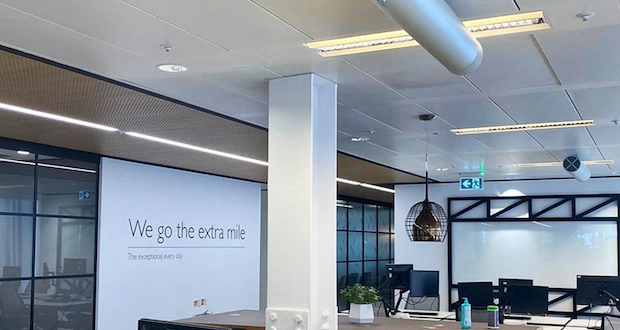More than a third of workers (35 per cent) are still concerned their offices aren’t COVID secure, according to new research from Mitie. With COVID-19 restrictions set to end on July 19, more than half (52 per cent) of British people currently working from home say they are ready to return to the office, but only between two and three days per week. Three fifths (60 per cent) think that the company they work for needs to improve the office environment to prevent staff becoming ill in the future.
When asked what measures would make employees feel more confident in returning to the workplace, hand sanitiser at every desk, toilets cleaned more frequently, better ventilation systems, and more space between workstations were top of the list. Office workers are also keen to see their employers invest in the latest technology to ensure their workplaces are safe – with systems using ultraviolet light to kill germs, for example to clean air and surfaces, thermal imaging technology which can detect when people have a raised temperature and desk booking apps all featuring on their wish lists.
The research also highlights how important good office facilities are in order for employees to feel happy to return to workplaces and attracting top talent to the business. Four fifths (81 per cent) of respondents say they wouldn’t want to work for a company that had poor office facilities, compared to more than three quarters (79 per cent) who would be attracted to an employer who has invested in technology to ensure a safe return to their workplace.
It’s unsurprising that two fifths of office workers (43 per cent) admit to now suffering from ‘Work from Home fatigue’. The research found that over a third (35 per cent) of workers think their career has been negatively affected by working from home – with this figure rising to almost half (47 per cent) amongst those aged 18 to 34. Meanwhile more than half (55 per cent) think that team collaboration and creativity has been hampered by working from home.
The study shows that balance is key when it comes to where colleagues want to work. Nearly nine in ten (87 per cent) respondents want a flexible working pattern which allows them to work from home or the office depending on the task, while three quarters (74 per cent) wouldn’t work for a company that didn’t allow them to work flexibly.
Daniel Guest, Chief Operating Officer, Technical Services, Mitie, said: “Whilst working from home has been a success for many it’s clear that people are ready to return to the office, but employees need to be reassured that their workplace is clean and safe.
“It’s important that businesses listen to their colleagues’ concerns and ensure the workplace is a safe environment ready for their return. This can include small gestures like hand sanitiser on desks and free masks, but also investing in technology like systems that use ultraviolet light to kill germs or thermal imaging cameras to detect when people have a raised temperature will go a long way to ensuring colleagues are confident with coming back to the office.”
Top workplace changes office workers want to see:
- Hand sanitiser at every desk
- Toilets cleaned more frequently
- Better ventilation systems
- Better cleaning regime generally
- More space between workstations
- Increased ‘touch point’ cleaning – bannisters, door handles etc…
- Free masks
- Reduced office/meeting room capacity to allow for social distancing
- One-way systems
- More visible cleaners
- Desk booking apps/systems
- Rules around making drinks for others
- Ultraviolet (UV) disinfection which uses UV light to kill germs
- Thermal imaging technology which can detect when people have a raised temperature
Pictured: Mitie’s reopened Head Office in The Shard following the installation of UV air disinfection technology, thermal imaging cameras, and the use of long-lasting anti-viral cleaning products.
In order to understand how FMs have navigated their way through the last year and their plans for meeting stringent waste and recycling targets we’ve posed a series of questions – aided by the advice and experience of our editorial steering committee.
The results of the 2021 survey will be published in FMJ magazine and form the basis of a white paper co-written by FMJ and the experts at Grundon on how to approach waste and recycling strategies.
To take part in the survey click here.





